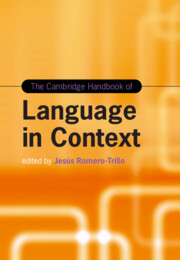Book contents
- The Cambridge Handbook of Language in Context
- Cambridge Handbooks in Language and Linguistics
- The Cambridge Handbook of Language in Context
- Copyright page
- Contents
- Figures
- Tables
- Contributors
- Acknowledgments
- Language in Context Studies
- Part I Language in Context: A Sociohistorical Perspective
- 1 Conversation Analysis
- 2 Context in Historical Linguistics
- 3 Context in Discourse Analysis
- Part II Philosophical, Semantic, and Grammatical Approaches to Context
- Part III Pragmatic Approaches to Context
- Part IV Applications of Context Studies
- Part V Advances in Multimodal and Technological Context-Based Research
- Index
- References
2 - Context in Historical Linguistics
from Part I - Language in Context: A Sociohistorical Perspective
Published online by Cambridge University Press: 30 November 2023
- The Cambridge Handbook of Language in Context
- Cambridge Handbooks in Language and Linguistics
- The Cambridge Handbook of Language in Context
- Copyright page
- Contents
- Figures
- Tables
- Contributors
- Acknowledgments
- Language in Context Studies
- Part I Language in Context: A Sociohistorical Perspective
- 1 Conversation Analysis
- 2 Context in Historical Linguistics
- 3 Context in Discourse Analysis
- Part II Philosophical, Semantic, and Grammatical Approaches to Context
- Part III Pragmatic Approaches to Context
- Part IV Applications of Context Studies
- Part V Advances in Multimodal and Technological Context-Based Research
- Index
- References
Summary
Historical linguists investigate those contexts that are considered to be most relevant to language change, given the theoretical approach adopted and the phenomena to be investigated. The topic of this chapter is usage-based perspectives on language-internal change, especially as conceptualized in the frameworks of research on grammaticalization, semantic-pragmatic change, and diachronic construction grammar. Contexts may be immediate, local “co-texts” or wider linguistic discourse contexts. Contexts tend to be wide and discursive as change begins to occur and local after it has occurred. I discuss the roles in enabling change of ambiguity, of pragmatic inferencing, and of “assemblies of discursive uses” such as have been proposed in work on constructionalization. With respect to contexts for “actualization,” the step-by-step language-internal spread (or loss) of a change that has occurred, focus is on host-class expansion and on the often analogy-driven changes across contexts, especially as revealed in corpus work.
Keywords
Information
- Type
- Chapter
- Information
- The Cambridge Handbook of Language in Context , pp. 49 - 70Publisher: Cambridge University PressPrint publication year: 2023
References
Accessibility standard: Unknown
Why this information is here
This section outlines the accessibility features of this content - including support for screen readers, full keyboard navigation and high-contrast display options. This may not be relevant for you.Accessibility Information
- 5
- Cited by
